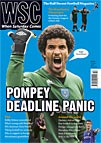 Saul Pope looks at the relationship between short-term solution, long-term planning and nationality in Russian football
Saul Pope looks at the relationship between short-term solution, long-term planning and nationality in Russian football
Considering he was sacked by his club following a series of disappointing results, the warm send-off Dick Advocaat received from Zenit St Petersburg fans was unusual and pleasantly surprising. In a league where managers from outside the former USSR have struggled to make a serious impact and many have been fired within a few months, his achievements with Zenit should also not be underestimated.
Thanks to having richer owners and a deficit in talented local managers, most of the big Moscow sides have appointed a non-Russian coach at some point over the last decade. So far none has lasted a 30-game season, and second is not an option – the Serb Slavoljub Muslin found himself sacked at Lokomotiv with his team in that league position.
Late last season Michael Laudrup was the surprising choice to end Spartak Moscow’s run of seven seasons without a championship, though he had just five games this season before the axe fell. The decision disappointed fans, though it seems to be typical of the impatience of those running the Moscow clubs – Nevio Scala and Artur Jorge, managers with considerable pedigree and experience, were both quickly fired when Spartak and CSKA failed to immediately challenge for the title.
As well as seeming to expect foreign managers to provide instant success, club owners have shown a tendency to interfere in team affairs that westerners are not accustomed to. Englishman Paul Ashworth was first team coach at FC Rostov, but found himself disagreeing with the club’s “ethics” and resigned after being asked to “do something I didn’t agree with”.
The Czech coach Vlastimil Petrzela, Advocaat’s predecessor at Zenit, wrote of his first meeting with future club president and Gazprom representative Sergei Fursenko that he was reprimanded for “saying rubbish in the newspapers” and told that from now on “we will be dealing with transfers”. More recently, Advocaat openly criticised the club for bringing in Italian midfielder Alessandro Rosina, rather than the striker he wanted, without consulting him.
However, club owners have problems of their own. Russia is not considered a long or even medium term destination for most foreign football managers, meaning that tempting contracts have to be offered for even relatively unknown trainers – Israeli Itzhak Shum, in charge of Alania Vladikavkaz for three months in 2005, stated that what he liked most about football in Russia was “the money”.
Advocaat had intended to leave Zenit to coach Australia after winning the league in 2007, but changed his mind when offered a reported $4 million (£2m) per year to stay – more than double what the Australians were willing to pay. He spent much of the season knowing that he’d leave Zenit in December to become Belgium coach, a factor which affected performances. Knowing that the foreign specialist is largely in it for short-term gain and likely to leave should a better offer turn up, it is perhaps not surprising that club owners react quickly when they sense potential failure and feel justified in interfering in team affairs.
During Advocaat’s largely successful tenure, some fans and ex-players have lamented Zenit turning into an “international” club. English was suddenly the lingua franca because the manager did not speak Russian. Previous managers had promoted local talent, though the Dutchman looked to Europe for reinforcements – although it brought initial success, Fernando Ricksen and Fatih Tekke now make up the numbers on the bench, rather than hungry young locals.
Alexander Panov, who played under Advocaat at Zenit, has suggested that Andrey Arshavin – who came though the club’s youth system – would not have been given a chance in the current team. The lack of success of imported managers means that other clubs have not felt this impact yet, though Zenit’s example sets a worrying precedent for young Russian players and fans alike.
The experiments with foreign managers continue – Zico has put CSKA Moscow among the front runners since joining in the close season, and Zenit seem intent on appointing either Claudio Ranieri or Roberto Mancini to replace Advocaat. Young Russian managers are beginning to make waves this season – Andrei Kobelev and caretaker Valeriy Karpin have improved Dinamo Moscow and Spartak respectively, but the big clubs will probably continue to walk a tightrope over the next few seasons.
On one hand they are seduced by the quick success and glamour that foreign managers can bring, but on the other they remain vulnerable to those only interested in making money and to an erosion of local identity. This may sound all too familiar to followers of the English game over the last 15 years.
From WSC 272 October 2009